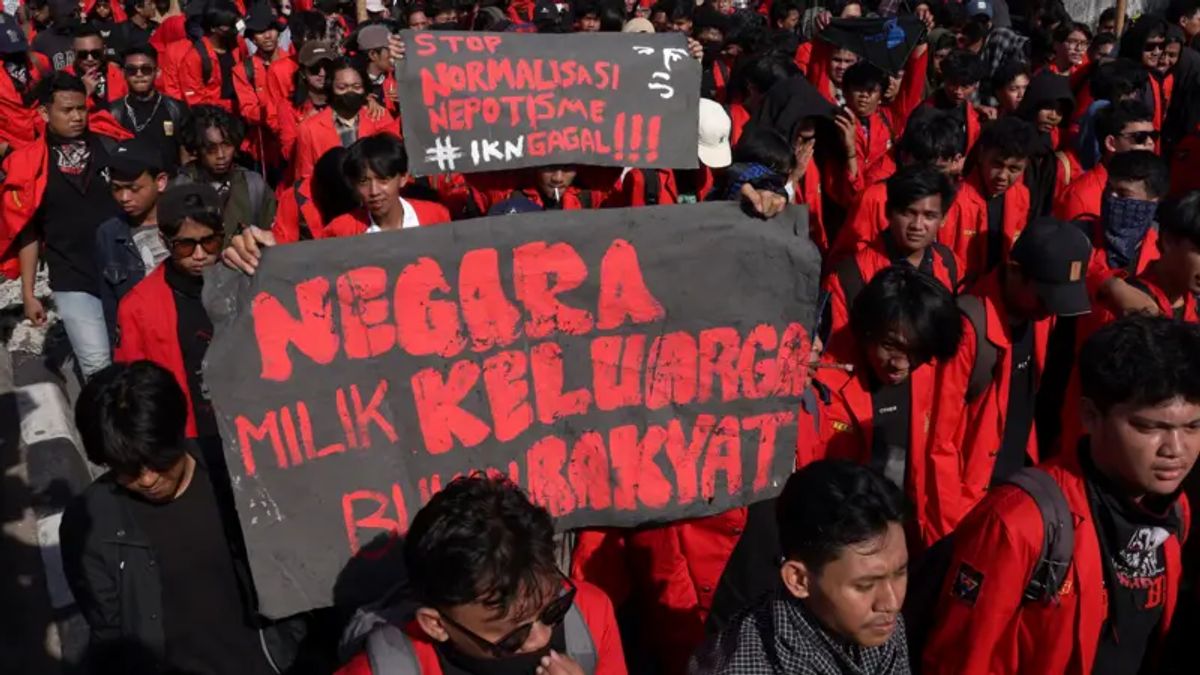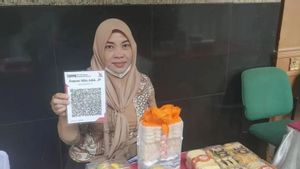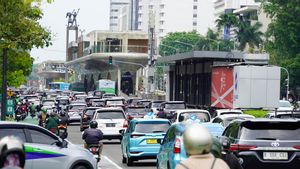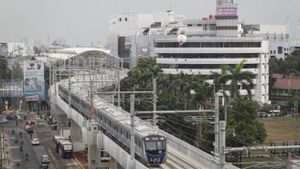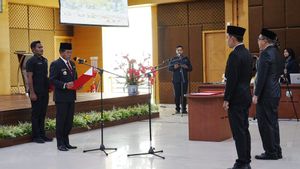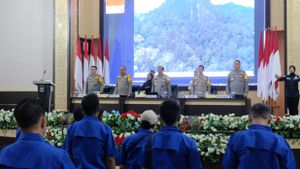JAKARTA Indonesian democracy is starting to chill, it could be because of the cold or fear. That's the reality that happened in 2024, and it is possible that it will continue. There are even concerns that 2025 will not become a democratic year for this country.
Backed down to 2014 when Jokowi was elected 7th President of the Republic of Indonesia. Jokowi's appearance was greeted by a commotion. This boyolali native man became a symbol of the 'wong cilik' representation in the Indonesian political system, which for years has been dominated by oligarchs.
"For the past four years I have been silent. But now I have to answer. I have to say. My mother is a villager in Boyolali," said Jokowi during a briefing on the Consolidation of the Indonesian Coalition for the Work of Banten Province at ICE BSD, South Tangerang, Sunday (4/11/2018).
Jokowi needs to convey this in order to answer the black campaign, which always cornered himself as a child of Chinese descent from Singapore named Oey Hoi Liong.
The hopes of supporters of democracy for Jokowi's existence are very high. Indeed, the spice of hope seems unrealistic, but this condition must exist in every change in Indonesia's political map.
In 2024 everything changes. High optimism in Jokowi's role in the progress of Indonesian democracy is starting to fade. The community is divided, located at a crossroads. Some are still embedding Jokowi, some are not. The former President is no longer considered a reformist 'outer person', but part of the oligarchy.
Indonesia's democratic condition is currently not doing well. Starting from the decline in democracy, poverty, economic inequality, agrarian conflicts, criminalization, environmental damage, national education commercialization, to various frauds in the 2024 General Election, "as written on the Agrarian Update Consortium (KPA) website when commemorating Labor Day, May 1, 2024.
Jokowi is accused of violating many rules in order to smooth out the steps of his eldest son, Gibran Rakabuming Raka to run as a vice presidential candidate in the 2024 election. Jokowi's political steps have proven successful in smoothing Prabowo Subianto's election as the 8th President of the Republic of Indonesia, as well as bringing Gibran as his representative.
The Prabowo-Gibran pair won a landslide victory with more than 55 percent of voters. Far behind their competitors, Anies Baswedan-Muhaimin Iskandar and Ganjar Pranowo-Mahfud MD. This situation further clarifies the confidence of the supporters of democracy, that the cold political climate is likely to be increasingly frozen and chills in the future.
In his remarks at the 60th Anniversary of the Golkar Party at Sentul International Convention Center, Bogor, last Thursday, December 12, Prabowo reaffirmed the idea of removing the Pilkada directly. The pretext he put forward was about cost savings.
In my opinion, we have to improve our system. And we must not be ashamed to admit that the possibility of this system is too expensive. Even from the faces that won I saw sluggish too. Those who win sluggishly, let alone those who lose," said Prabowo.
Prabowo gave an example of countries such as Malaysia, Singapore, and India which according to him could save a lot of budget by only choosing the DPRD. After that, the DPRD chose the regional head.
"I see that our neighboring countries are efficient. Malaysia, Singapore, India have chosen DPRD members once, so it is the DPRD that chooses the governor or regent," Prabowo said again at the event.
Prabowo's proposal clearly sparked criticism from pro-democracy activists. They believe that very expensive financing, Prabowo said trillions of rupiah in just one or two days, is an investment.
Looking back, Prabowo's attitude is a characteristic of his rejection of democratic reform after President Soeharto collapsed in 1998. In 2014 and 2019 Prabowo also mentioned the idea of returning to the original 1945 Constitution, namely the president elected by the MPR.
If the idea is implemented then it means the abolition of the 1999-2002 constitutional amendment, which is the basis for Indonesia's democracy to be built constitutionally at this time.
This paved the way for a president to end the presidential election in person, abolish the presidential term of office, and even dissolve the Constitutional Court. This same situation has the potential to rule out the rule of law in Indonesia, which is already very weak.
After being inaugurated, Prabowo not only included many military figures in his government. He also invited non-elite groups, including activists and victims of violence at the end of the Suharto regime, to strengthen the legitimacy of Suharto's former son-in-law.
It is unrealistic to expect them to be able to limit Prabowo's movement as President of the Republic of Indonesia. Departing from experience, activists who aspire to 'fight for changes from within the Palace', are soluble to support all policies, even those who are authoritarian.
Civil society organizations, such as Nahdlatul Ulama and Muhammadiyah, which are expected to maintain their independence are also difficult to expect. Even since Jokowi's time, social and religious organizations that are considered progressive are easily used as a political tool to protect the interests of the authorities at the expense of public rights.
The political space for the progressives of Indonesia to advance democracy is even narrower. One real example is in the case of the Megaproject Rempang Ecocity in Batam, Riau Islands which involves non-state actors to be mobilized to suppress public protests. Or the latest ban on five paintings that will be exhibited by the painter Yos Soeprapto at the National Gallery, Jakarta last week, just because there was a depiction of a figure resembling Jokowi.
The creation of a sustainable pro-democracy movement with a larger and stronger base of civil society needs to be done. However, such a strategy is only easy to say, it is very difficult to implement. The fragmentation of Indonesian civil society is getting bigger. This is not only seen in the real world, but also in cyberspace.
It is undeniable that the civil society in Indonesia is facing a long democratic winter. The big challenge to defending democracy in Indonesia is to involve as many people as possible, in order to increase the political impact so that the freezing and even the destruction of Indonesian democracy do not occur.
BACA JUGA:
The English, Chinese, Japanese, Arabic, and French versions are automatically generated by the AI. So there may still be inaccuracies in translating, please always see Indonesian as our main language. (system supported by DigitalSiber.id)
